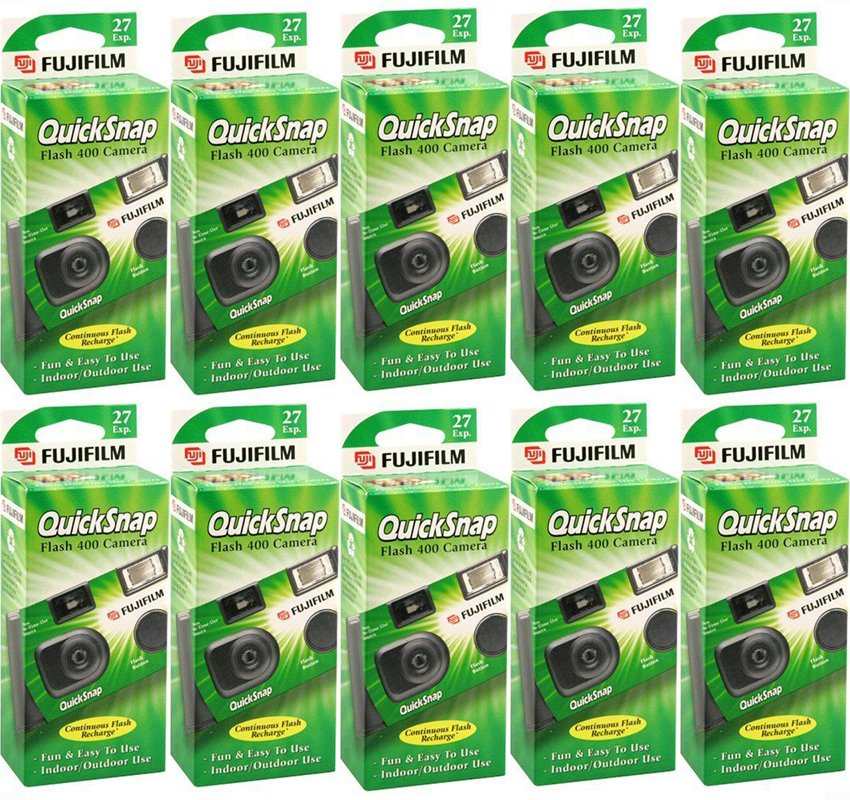Rediscovering Analog Charm: The Allure of Disposable Cameras
Developing Disposable Cameras Online
In an age dominated by high-resolution digital cameras and instant photo-sharing apps, the charm of disposable cameras has made a surprising comeback. Capturing moments with these simple, single-use devices provides a nostalgic and authentic touch to photography. What adds to the appeal is the option to develop disposable camera film online, bringing the analog experience into the digital era.
The Resurgence of Disposable Cameras:
Disposable cameras have seen a resurgence in popularity, driven by a desire for tangible memories in a world inundated with digital content. The limitations of disposable cameras – fixed focus, lack of manual settings, and the unpredictability of film development – have become their unique selling points. Users are drawn to the idea of embracing imperfections and relishing the surprise element in each shot.
Developing Disposable Camera Film Online:
The convenience of disposable cameras extends beyond their ease of use; it now includes the option to develop the film online. Several websites cater to the growing demand for developing disposable camera photos, offering a hassle-free process that allows users to relive their analog adventures in a digital format.
1. **Shutter Junkies Photo:**
- Website: Shutter Junkies Photo Lab
- Shutter Junkies’ main focus is disposable cameras! We develop thousands of disposable cameras each month, new and old, from all manufacturers. We’ve developed several specialized processes that give your images the best possibly quality look.
2. **The Darkroom:**
- Website: The DarkRoom
- The Darkroom specializes in film developing, including disposable camera film. Users can mail their disposable cameras, and the company will develop the film, scan the images, and provide digital files for easy online sharing.
3. **MPIX:**
- Website: MPIX
- Mix offers film developing but really shines when it comes to prints and print options. They offer a broad range of options and and sizes.
The Process:
Developing disposable camera film online is a straightforward process. Users can typically follow these steps:
1. **Order Online:**
- Visit the website of the chosen service provider.
- Select the disposable camera film development option.
2. **Mail Your Camera:**
- Follow the instructions to mail your disposable camera to the provided address.
3. **Wait for Processing:**
- Once the camera is received, the film is processed, and the images are scanned.
4. **Receive Digital Files or Prints:**
- Users can choose to receive digital files for online sharing or opt for physical prints delivered to their doorstep.
Conclusion:
The trend of disposable camera photography and online film development is a testament to the enduring appeal of analog experiences in a digital world. It allows individuals to relive the excitement of waiting for film development while enjoying the convenience of online sharing. As technology advances, the appreciation for the simplicity and unpredictability of disposable cameras continues to grow, offering a unique and tangible way to capture and share memories. So, next time you embark on an adventure armed with a disposable camera, consider the convenience of developing your film online to preserve those moments in a tangible and lasting format.
Why Do Disposable Cameras Expire?
Milk goes bad, bread gets moldy, but did you know that even disposable cameras expire? Don’t believe me? Take a look at the bottom of your disposable camera. There you’ll see an expiration date. Most disposable cameras expire two years after their manufacture date, which gives you plenty of time to use and develop your camera. Butf let’s look a little more deeply into why disposable cameras expire in the first place!
Why do Disposable Cameras Expire?
Disposable cameras typically have an expiration date due to several factors associated with their design and components. Here are some reasons why disposable cameras have expiration dates:
Chemical Degradation:
Disposable cameras use film that contains chemicals sensitive to light. Over time, these chemicals can degrade, affecting the quality of the images. The expiration date is an estimate of the time until the film's chemical composition starts to break down.
Battery Life:
Disposable cameras often come with a built-in battery to power the flash and other electronic components. The battery has a limited lifespan, and the expiration date ensures that users don't keep the camera for so long that the battery becomes unreliable.
Quality Assurance:
Camera manufacturers set expiration dates to provide a guarantee of optimal performance. Beyond the expiration date, the manufacturer cannot ensure the same level of image quality or reliable functionality.
Shelf Life:
Disposable cameras are often stored in warehouses or on store shelves before being purchased. The expiration date helps manage inventory and ensures that customers receive products with a reasonable shelf life remaining.
User Expectations:
Setting an expiration date helps manage user expectations. Manufacturers want to avoid situations where users are disappointed by the performance of an old disposable camera and blame the product for subpar image quality or malfunctions.
Technological Advances:
The expiration date also reflects the pace of technological advancements. Cameras may become outdated as newer models with improved features are introduced. Manufacturers want to encourage users to adopt newer technologies.
It's important to note that while disposable cameras have expiration dates, they may still function and produce usable images for some time after that date. However, the quality of the images and the reliability of the camera's components may decline as the camera ages. If you plan to use disposable cameras for a specific event, it's advisable to check the expiration date and purchase cameras with a date well beyond the date of your event to ensure optimal performance.
Buy Bulk Disposable Cameras
Where can you buy disposable cameras in bulk? This article gives some great practical tips on finding enough cameras for your next event!
They’re fun, small, easy to use, and are great at gatherings! People still love disposable cameras and they especially love them at weddings and parties! But with stores only stocking a few disposable cameras at a time, buying enough to supply your event has become a challenge. Even after you clear out all of the shelves at your local Wal-Mart, Walgreens, CVS, or Target, you still might not have enough cameras to make sure everyone at your event can snap photos of those amazing moments! Let’s take a look at where you can pick up disposable cameras in bulk!
Where can I buy Bulk Disposable Cameras
If you're looking to buy disposable cameras in bulk, there are several options you can explore:
Online Retailers:
Websites like Amazon, Alibaba, or eBay often have bulk options for disposable cameras. You can find various brands and quantities to suit your needs.
We often create bulk camera deals for customers! Click Here to ask us about our Bulk Disposable Camera Packages
Wholesale Distributors:
Consider reaching out to wholesale distributors or suppliers that specialize in photographic equipment. They may offer better prices for bulk orders.
Local Camera Shops:
Contact local camera shops or photography supply stores to inquire about bulk purchasing options. They may have special deals for larger quantities.
Photography Trade Shows:
Attend photography trade shows or conventions where you can connect with manufacturers or distributors directly. These events often feature special pricing for bulk purchases.
Specialized Suppliers:
Look for suppliers that specifically cater to event planners, weddings, or large gatherings. They may offer disposable cameras as part of their services, and you can negotiate bulk deals.
Check with Manufacturers:
Reach out to disposable camera manufacturers directly. They may be able to provide information on bulk purchasing options or direct you to authorized distributors.
Local Photography Communities:
Check with local photography clubs or communities. Members might have recommendations for suppliers or be interested in a group buy to get better prices.
Before making a purchase, be sure to consider the following:
Quality and Brand: Ensure that the disposable cameras meet your quality standards, especially if they are intended for a special event.
Shipping Costs: Factor in shipping costs, especially when ordering from online retailers or international suppliers.
Return Policy: Check the return policy in case there are issues with the cameras upon delivery.
Customization: If you're ordering for a specific event, check if the supplier offers customization options, such as branding or personalized packaging.
Cost Comparison: Compare prices from different sources to get the best deal for the quantity and quality you need.
Remember to verify the reliability of the supplier, read customer reviews, and ensure that the cameras meet your specific requirements before finalizing your purchase.
You should also consider the cost of developing your disposable cameras after they are shot. With developing costs ranging from $10 to $15 or more per camera, transforming those cameras into images can be a big surprise and a shock to your budget. Many photo labs can work with you on bulk orders. Our photo lab here at Shutter Junkies can offer special bulk developing discounts. Reach out to us by clicking the link below and get your developing costs figured out before you buy all those cameras!
Capturing Memories: The Timeless Charm of Disposable Cameras
Disposable Cameras are a great way to create and share memories!
The Timeless Charm of Disposable Cameras
In today's fast-paced digital age, where high-quality smartphones and advanced DSLR cameras dominate the photography scene, it may seem odd to talk about disposable cameras. However, these humble, single-use devices have a unique charm and nostalgic appeal that continue to captivate photographers and adventurers alike. In this blog post, we'll delve into the world of disposable cameras and explore why they are still relevant in the age of digital photography.
The Allure of Analog
Disposable cameras are an embodiment of analog photography, a realm that many photographers find enchanting. The tactile nature of winding film, the anticipation of not knowing how your photos turned out until they're developed, and the distinct vintage aesthetic all contribute to their enduring appeal. In a world dominated by instant gratification, disposable cameras force us to slow down and savor the process of photography.
Affordable and Accessible
One of the most significant advantages of disposable cameras is their affordability and accessibility. Unlike expensive DSLR cameras or high-end smartphones, disposable cameras are budget-friendly, making them an excellent choice for those looking to experiment with photography without breaking the bank. They are also readily available at most convenience stores, making them accessible to anyone, anywhere.
A Traveler's Best Friend
If you're an avid traveler, disposable cameras can be your best companion. They are lightweight, compact, and don't require charging or extra accessories. Plus, they're less likely to draw unwanted attention compared to expensive camera gear, making them perfect for capturing candid moments on the go. Whether you're exploring a bustling city or embarking on a wilderness adventure, a disposable camera is a reliable sidekick.
The Element of Surprise
One of the most exciting aspects of disposable cameras is the element of surprise. You never know exactly how your photos will turn out until you get them developed. This sense of anticipation and unpredictability adds an element of excitement to the process of photography. Each click becomes a unique moment frozen in time, whether it's a perfectly composed shot or a quirky, imperfectly framed memory.
Preserving Memories
In the digital age, we often snap hundreds of photos without ever looking at them again. With disposable cameras, the limited number of exposures (usually 24 or 36 per roll) encourages us to be more selective and intentional with our shots. Each frame becomes a cherished memory, carefully preserved on film. Holding physical prints in your hands and flipping through them is a tangible experience that digital photography can't replicate.
Embracing Imperfection
Disposable cameras have a charming imperfection to them. The grainy texture, occasional light leaks, and the absence of high-tech features can add character to your photos. These quirks make every shot unique and add a layer of authenticity that is often missing in the overly polished world of digital photography.
Conclusion
While disposable cameras may seem like relics of the past in our digital-dominated world, they offer a unique and enduring charm that continues to attract photographers and enthusiasts. Whether you're a seasoned pro or a casual snap-happy traveler, consider picking up a disposable camera for your next adventure. Embrace the analog experience, savor the element of surprise, and relish in the timeless joy of capturing memories on film. In a world that's always rushing forward, disposable cameras remind us to slow down and appreciate the art of photography in its purest form.
Find out more about disposable cameras by browsing our Blog Here!
Film is Here it Stay According to Eastman Kodak!
Eastman Kodak Is committed to keeping film alive!
Do they still make photo film?
I get this question like a thousand times a week in emails and questions from customers. As an avid film photographer and enthusiast and also the owner of a film lab, I can say that I’m definitely all in on film! But there was a time only a few years ago when I feared that film might be gone forever. And a lot of people already thought it was gone. Do they still make film? I thought that stuff disappeared years ago?
Yes, they still make film for cameras. They still make 35mm film, they still make 120 film, they still make 110 film and they still make sheet film in a wide variety of sizes. And now, Eastman Kodak, the worlds largest manufacturer of color film has announced that they will continue to make film!
As Long as there is Demand
In a call to investors, Eastman Kodak’s CEO, Jim Continenza stated that as long as there was a demand for film, Eastman Kodak would continue to produce it! This comes as a huge relief for all of us film shooters who, in the back of our minds have feared the end of film as the supply chain has slowly crumbled since the film apocalypse occurred in the 2010’s. According to Kodak, film demand remains strong and the market has even seen growth since the pandemic. More and more photographers have been switching back to film for the unique look and feel it gives to images.
We’ve seen drastic increases in demand for disposable cameras as well. Even simple film cameras are popular once again and flying off of the shelves!
Just like Eastman Kodak, Shutter Junkies is equally committed to film and keeping the art and science alive! We are struggling against the failing infrastructure and working hard to support new companies and new technologies that will help propel film to the next level. We’ve been building some great partnerships with some very promising tech companies out there that in the coming months will help us to move our developing production to a whole new level and help us to finally over come our slow and laborious processes and get us back to the speed and efficiency of processing film that labs were capable of in the 1990’s and 2000’s when film was in its golden age.
It takes all of of us to keep film alive!
Kodak has made it clear that it’s going to be a team effort to keep film alive! Keep shooting film and make it more of your daily photography process and remember, every time you choose film over your cell phone you're reviving an entire infrastructure of scientists, artisans, entrepreneurs, and creatives!
Check out the original article at Kosmofoto by clicking here - There’s lots more great information there!
Who Develops Disposable Cameras - A Guide for Everyone
Where can you go to get your disposable camera developed in 2023?
Getting your film disposable camera developed isn’t as easy as it used to be. Finding a lab that can develop disposable cameras is getting difficult as some labs don’t want to be bothered with the extra work it takes to process them. This post is list of all of the labs that can help you get your disposable camera developed!
There are no reviews here, just a list with links! If you’d like to read more about getting your disposable cameras developed, check out our other blog post, Where do I get Disposable Cameras Developed?
Disposable Camera Developing - Mail-in Labs
|
Lab |
Website |
Location |
Price Per Camera |
|
Shutter Junkies |
Quinlan, Tx |
$9.00 |
|
|
The Dark Room |
San Clementa, CA |
$16.00 |
|
|
MPix |
Pittsburg, KS |
$13.95 |
|
|
Process One |
Overland Park, KS |
$4.99 (Scans Not Included) |
Disposable Camera Developing - Local Labs
Walmart, CVS, and Walgreens still develop film and can develop disposable cameras. These stores have a developing price based on the number of exposures. The table listed below has the prices for developing the standard 27 exposure disposable camera. These prices include prints and most times a CD with your photos on them. I just hope you still have access to a CD drive!
|
Walmart |
$10.96 |
|
|
CVS |
$14.99 |
|
|
Walgreens |
$15.99 |
Beyond these big store chains, larger cities almost always have a photo lab or two. Simply search for “Photo Labs Near Me”. Since disposable cameras all just contain a roll of 35mm film, any photo lab can develop them. We definitely recommend supporting mail-in labs and local business before sending your film to one of the big stores. We’ve heard reports of really bad customer service and lost film from Walmart, Walgreens, and CVS.
Don’t Let Those Cameras Sit Around!
No matter where you take them to be developed, don’t let your disposable cameras sit around. Film degrades over time and not getting your disposable camera developed can cause your images to have decreased quality.
Where Can I Buy Disposable Cameras for My Wedding
Looking for cheap disposable cameras for your wedding? Here’s all the places where you can find and compare bulk disposable cameras!
Disposable cameras can be a great idea to make your wedding and reception a fun and interactive event! Guests will love grabbing a camera and snapping moments all throughout your wedding. Wedding disposable cameras can help to keep your guests engaged when most people start to get bored. If you’d like to read more about whether or not you should get disposable cameras for your wedding, check out our Previous Blog Post Here!
Can I Buy Disposable Cameras for my Wedding in Stores?
Yes! You can pick-up disposable cameras in several stores. Walmart sells Fujifilm disposable cameras and Walgreens and CVS sell Kodak Funsavers and HD Powerflash cameras that you can pick-up. BestBuy also sells Fujifilm Quicksnap disposable cameras in most stores. Beyond these locations, it can be quite difficult to find disposable cameras in stores. And even worse, you’re not going to be able to get any sort of discount at any of these big box stores. Buying a lot of cameras at full retail can get very expensive very fast. It would definitely be a good idea to shop elsewhere for wedding disposable cameras or bulk disposable cameras.
Can I Buy Disposable Cameras in Bulk Online?
Yes! Buying disposable cameras for your wedding is easy when shopping online, if you know where to look. There are both good and bad disposable cameras out there and since there are lot more options when shopping online for disposable cameras, we are going to explore each site in a little more detail.
Buy Bulk Disposable Cameras on Amazon
Amazon is probably the first place most people look to purchase disposable cameras in bulk. While it’s the first place most people think of, it isn’t necessarily the best option. Higher prices and lower quality can be a problem when shopping on Amazon. But there are a big range of sizes and options on the wedding disposable camera packs which at least gives you the ability to find a wedding disposable camera pack that can fit your needs.
When you go to Amazon, simply search for Wedding Disposable Camera Packs. While shopping, it can be a little overwhelming to try and figure out the best deal. The easiest way to compare pricing is to try to find the price per exposure (aka picture). Some camera packs have 12 cameras and may be cheaper than a wedding disposable camera pack with 6 cameras, but what you might be missing is how many exposures (pictures) there are on each camera. Some cameras come with 27 exposures, some with 24, some with 17, some with 12 or less. Take the number of cameras in the pack and multiply it by the number exposures on each camera. Then divide the price by that number. So a 10 pack with 27 exposures (10x27=) has 270 pictures. If that pack is $150 when dived 150 by 270 (150/270=) $.55 per picture. The price per picture math is a little complicated but it helps you to evaluate the value that you’re getting.
Another thing to consider when shopping on Amazon for wedding disposable cameras is whether to buy new Kodak or Fujifilm cameras, new off-brand cameras from China, or reloaded cameras. The build quality and reliability on Kodak and Fujifilm disposable cameras is much higher than every other camera out there. Off-brand cameras from Alibaba/China are ok, but usually have issues with film scratches and less that stellar build quality. But these work relatively well and can save you quite a bit of money. The last type of disposable, the reloaded used bodies can be the absolute worst. These come wrapped in cardboard wrapped with really pretty decorative prints, but the decorative print hides the disaster underneath. Many of these are manufactured from rebuilt Fujifilm Quicksnap cameras. These cameras have plastic welds and are broken in the reloading process. But these companies that sell these use a lot of cardboard and electrical tape to hold the cameras together. These cameras are prone to failures and don’t hold up very well. These are usually the cheapest, but not always.
Besides considering price, read camera reviews and ask the seller questions, specifically if the camera bodies are new or repurposed and what kind of film is inside. You can find some really great wedding disposable cameras on Amazon, you just have to been careful while shopping!
Buy Wedding Disposable Cameras on eBay
Very similar to Amazon, eBay has a really big selection of Bulk Disposable Cameras for Weddings. Everything we mentioned about in talking about Amazon is true for eBay.
Buy Wedding Disposable Cameras on Etsy
Another great place to buy disposable cameras for your wedding is Etsy! The same benefits and warnings about buying cameras on Amazon can apply to Etsy as well, but on Etsy it’s usually easier to contact the seller and request custom packages or options. Ordering from Amazon will give you speed, but ordering from Etsy will give you a lot of options and better customer service.
We actually sell a lot of wedding packs on Etsy. From the selling side, we’ve had a very positive experience working with customers on Etsy. There are a lot of great sellers out there that can help you with you getting disposable cameras for your wedding. We advise using the same method of evaluating value by determining price per exposure (picture). You should also check to see if shipping is included or not, as not every Etsy seller has free shipping. Definitely include your shipping costs in the cost per exposure calculation to evaluate value.
Buy Wedding Disposable Cameras on Alibaba
And yes, you can buy disposable cameras in bulk on Alibaba. To be honest, most of the disposable cameras on Amazon and half of the ones on Etsy actually come from Alibaba. If have the time to wait for your cameras and don’t mind paying more for shipping, it can actually save you a lot of money. Many sellers on Alibaba allow for small minimum order quantities and you can even pick your colors and a few other options.
So we at Shutter Junkies also develop disposable cameras. We actually specialize in them and have developed thousands of disposable cameras from weddings. We get a lot of these cameras and here’s our best advice about them. Usually these camera bodies (the plastic shell of the camera) are ok. They hold up alright and while they do malfunction from time to time, they are ok. The lens on these cameras is very low quality, which causes your images to be a little less sharp/more blurry and there is more distortion at the edges of the picture. If you’re shooting color film, you’ll notice quite a bit more chromatic aberration when comparing images to Fuji QuickSnaps or Kodak FunSavers.
The biggest issue with these cameras is the film. Mostly, these cameras from Alibaba all come with 17 exposures and the film is what we call “bulk loaded”. Bulk loaded film is taken from larger rolls and spooled off into the cartridges by hand. We have seen a lot of these wedding cameras from Alibaba have some very scratched up film. Also, almost all of these cameras actually come with Kodak cinema film loaded instead of photographic film. The Chinese manufacturers have removed the RemJet layer (which probably is why they are so scratched) and then labeled them to be developed in C-41 chemicals. While it works, this film performs much better when developed in ECN-2 chemistry, as Kodak intended.
All that being said, getting wedding disposable bulk cameras from Alibaba is an acceptable source!
Buy Wedding Disposable Camera Packs Directly from Retailers
If you’re wondering where to buy disposable cameras for a wedding, there are a lot of great websites out there where you can buy them directly. Just gonna mention here that we sell wedding disposable cameras packs, both new Kodak packs and we build up our own cameras in black and white and color. Send us a message here if you’d like to find out more!
Here’s a list of websites where you can purchase disposable cameras for your wedding:
Shutter Junkies - New Kodak cameras and Shutter Junkies disposables
Custom Camera Collection - Rebuilt cameras with custom labels/covers
Analog - New off brand camera bodies
Film Wholesale - Rebuilt cameras with wedding themed labels/covers
Where can I buy cheap disposable cameras for my wedding?
Amazon, Custom Camera Collection, Shutter Junkies, and Etsy all have great cheap wedding disposable cameras. But with ‘cheap’ cameras, there are usually some level of sacrifices you have to accept to get a lower prices. Sometimes its few frames (17 or 12 instead of 27). Sometimes it’s really low quality film. Sometimes its crudely reassembled camera bodies. And sometimes it’s a combination of all of these. Check out what you’re getting, examine the price per frame, and ask for examples of photos from real world weddings. You can also check with a photo lab and see what they think of a certain brand. We, at Shutter Junkies, develop hundreds of disposable cameras every week and we can definitely tell you which cameras produce good images and which ones do not. Feel free to send us a message at info@shutterjunkies.org to ask any specific questions!
It is possible to get affordable AND good quality cameras! You just have to do a little comparison shopping and see who’s offering the best deals.
Disposable cameras are a great way to celebrate your wedding day!
We love disposable cameras and have seen hundreds of happy couples use them to make their wedding and receptions something to remember! Disposable cameras allow guests to become part of the day in a very special way and giving them a wedding table camera allows you to see your wedding from a lot of different perspectives! If you’re considering disposable cameras for your wedding, they’re a great investment and will add big element of fun for you and your friends and family!
Where Can You Buy 110 Film?
Yes, you can still buy 110 film! Find out where you can pick-up some today!
As a kid growing up in the 1980’s I desperately wanted a camera. Honestly I have no idea why, every photo I took back then was absolutely terrible. For Christmas on year, my sister and I woke up to discover that among the transformers and He-Men, we had both gotten a 110 camera! That’s right, my very first film camera shoot 110 film! Honestly, I had no idea what it shot and I didn’t care, I had a camera and I was pumped. We both got two 110 film cartridges with our cameras and I had shot mine up by the end of the day. I loved every moment of getting people to pose, trying to catch people at awkward times, and just trying to make memories. It’s been almost 40 years since then, but I still love 110 film and cameras! The cameras are fun and really easy to use. The size of the film gives you a really unique image and the affordability of 110 film can’t be beat!
Can You Still Buy 110 Film?
Fortunately yes, you can! 110 Film cartridges are still being made and sold, but because they are not in as high of a demand, it has become a lot hard to find the cartridges. Several years ago, when film was dying off after the rise of digital, I began to buy up every used camera I could. One of the first film cameras I bought off of Facebook Marketplace for $4 was Vivitar 110 camera. It had that classic 110 rectangular shape, the braided strap and even a fake leather case. It was like brand new and just holding it in my hand brought back a flood of memories from the 1980’s. I couldn’t wait to start shooting, but I quickly ran into a problem. The film wasn’t in stores any longer. And it was really hard to find online. My excitement was quickly turning into disappointment until I discovered a company I had been buying other types of from was about to drop a new product!
Lomography 110 Film
Film had lost is luster and was succumbing to the digital wave of new cameras and tech, but one company was working hard to keep fun and creativity in photography. Lomography was releasing some interesting cameras, new film types, and challenging customers to “don’t think, just shoot”. Having ordered from them in the past, I received an email with an announcement one day that brought hope for my little Vivitar 110 - Lomography was going to be producing their own 110 film! Since then, happy 110 film photographers have been snapping photos without worrying about where their next roll will come from.
Lomography currently produces 110 film in the following styles:
LomoChrome Metropolis - ISO 100-400
LomoChrome Turquoise - ISO 100-400
LomoChrome Purple - ISO 100-400
For what was practically a dead format, Lomography has created a broad range of options for 110 photographers to pick from. Color Tiger is a tradition color negative film, and a great place to start as it has a lot of availability and is almost always in stock. Lobster red scale is also a color negative film, but like all red scale films is loaded backwards so that they light has to pass through the film base, giving your images a distinctly reddish hue. B&W Orca is one of my favorites, its a great black and white film and in the 110 format gives so much character to your images.
Lomography’s other three films are all LomoChrome, meaning that they are slide films that are meant for cross-processing in C-41 chemistry. Each film produces a different look and color palette for your images. As you can guess by their descriptions, Turquoise and Purple come in those hues and give you other color shifts while Metropolis develops more like a true cross-processed film giving you punchy and vibrant colors.
All of the films from Lomography are great and in the 110 format produce some fun and unique images. If you’re looking to buy some 110 film by Lomography, Amazon is a great place to shop for it! Click the button below to shop for 110 film on amazon!
You can also purchase Lomography’s film directly from their website. The only draw back here is that you are required to set up an account with Lomography to purchase film. This may be something you want to do, because they usually have stock on certain items when everyone else runs out. Click the button below to shop for 110 film on Lomography!
Fukkatsu 110 Film
A few years ago, our hopes were raised and then dashed by the announcements of a new 110 manufacturer, Fukkatsu. While Fukkatsu didn’t pan out to what we had hoped, you can still find Fukkatsu film from their last batch floating around out there. If you’d like to read more about Fukkatsu 110 Film, here’s a great blog post on the topic from the Film Photography Project!
Buy Expired Film On eBay
If you’re wanting to try shooting 110 film and want to save a little money, then buying expired film from places like eBay, Facebook Marketplace, and others might be a good idea. Of course, use caution when using any app that requires a personal meeting, but you can get some great deals on older film that will still produce some interesting images. Be aware and ask about how the film has been stored as it will have an affect on the quality of images that are produced. But if you’re down to save some money, expired film is a great place to start.
Where can you buy 110 Film?
The best brand to buy is Lomography 110 film as it is still being produced. You can purchase it directly from their website - lomography.com or through Amazon if you’d like to save on shipping. There are other websites that sell Lomography film as well, so you can shop for the best deal. You can no longer purchase 110 film from department stores like Walmart or Walgreens, but you can possibly pick some up if you live close to a photography store.
Get Disposable Camera Developed Digitally
Getting your disposable camera developed digitally is easy and only takes a couple of steps!
You tell your friends to say “cheese”, you click the shutter button, and as everyone laughs, you begin to wind your disposable camera to the next frame. But this time, it just keeps winding. It doesn’t click like it did before. You look down at your camera and you see that you’ve just taken you last photo. As you look back up at your friends, you realize how awesome all of the memories you’ve captured are! The excitement sets in, but then you realize you’ve got to get the pictures off of the camera. How do you get disposable cameras developed digitally?
How do you get a disposable camera developed digitally?
Even though your disposable camera is new, it uses an older technology, photographic film. There are no digital components in your digital camera, so how do you get the pictures on your disposable camera on your phone? How can you turn those pictures into digital photos? It’s going to involve a two-step process. The first involves fixing the images on your film and the second step is converting your film to a digital image. Let’s talk about those two steps.
Step 1 - Develop Your Disposable Camera
Once your film is shot, the images that are captured on the film are considered latent images. They are can still be erased, damaged, or destroyed through improper handling. More importantly, the film is still sensitive to light. You could actually load the film back into the camera and take photos again and you would end up with what is called a double exposure, or two images taken on the same frame of film. Beyond the sensitivity to like, there’s no visible image on the film. It’s just going to be a brown and opaque film. The first step to convert your disposable camera to a digital picture is to run the film through the chemical process that fixes the film and makes it non light-sensitive. This is called getting your film developed.
Almost all disposable cameras contain color negative film, which needs to be developing using the C-41 process. This process uses a developer chemical, a bleach, a fixer, and a final rinse (some processes combine bleach and fix into what is called a “Blix” process) and requires you to agitate the film in a light-tight container, at a very specific temperature, for a very specific amount of time. This process can be done at home, but the equipment and time needed make this something many photographers do not want to do. However, if you’re interested in developing your own film, here’s a link to get you all of the equipment you would need to get started!
Your other option is get your film to a photo lab. We’ve got a great article HERE about how to find a place to get your disposable cameras developed. Depending on where you live, there might be a photo lab near you that can help you get your film developed. If there isn’t, there’s always the option of mailing your disposable cameras in. Our photo lab handles a large number of mail-in disposable cameras. If you’d like to find out how to send your cameras in to us, just CLICK HERE to find out more!
The photo lab can get your disposable camera developed quickly and professionally and will be able to prepare your negatives for archival so you can save them for the future! Once your disposable camera is developed, we move on to step 2, scanning your images (aka, digitizing).
Step 2 - Scanning
In the past, after your film was developed it would be optically printed using an enlarger and photo paper. After the world transitioned to digital, the process changed. Today, almost all film photos are scanned and converted to a digital images. This is a process you can do at home with just a light and a cell phone for a low quality image or something you can have a professional lab do for you!
There are several different methods of scanning, but all basically result in a digital image being taken of the original negative. The quality of your scan and resulting pictures depends on the equipment used. A cell phone with a cheap backlight will give you a decent digital pictures from your negative, but a dedicated film scanner at lab will give you a much higher quality digital image. Here’s a link to a great article discussing that different pros and cons of different types of film scanning - LensLurker - Guide to Scanning Negatives.
Depending on the method of scanning your use, there may be an additional step required - color conversion. Many softwares and apps will do the negative color conversion for you. Some will not and you will have to try to do the color inversion yourself. The scanning method is important, and the color conversion process is just as important as negatives can have slightly different characteristics and inverting them incorrectly can give you a really terrible image.
I started scanning film before dedicated software really existed. I had to either trust the really awful software that came with my cheap film scanner or try the inversion myself and it just never turned out right. The colors were always off. I was so happy when better film conversion came along. One of my favorites that easy to use is Negative Lab Pro - which works as a plug-in on Photoshop Lightroom Classic.
The good news however is that if you do take your disposable camera to a lab to be developed, the scanning is usually included and labs normally have some of the best scanning equipment to give you really great images! Larger scans are always better but not necessary unless you're planning to print your images in a really large format. If you’re just viewing your images on your phone or social media, basic scans are more than sufficient.
Move Your Disposable Cameras Pictures to Your Phone or Computer
If you develop and scan the images yourself, its just a matter of uploading them or transferring them. You can add your images to your Google Drive or your Apple Photos app or upload them directly to social media. If your images are coming from a photo lab, you should receive either a link to an online gallery or a CD or flash drive. If you receive an online gallery link, you’ll need to download the images to your local computer or your phone or tablet. Make sure you select the highest download quality possible. Some galleries allow you to download your images in various sizes and downloading a smaller size might result in you getting really pixelated images.
Once you get your images downloaded, make sure to store them in a safe place and keep a back-up. Online galleries expire and hard drives can failed or get lost. A great way to preserve your images is to get prints and to store the negatives in a safe place. Properly stored negatives can be rescanned at any time so you can recover the images even if the digital copies are deleted or lost.
Getting Digital Prints of your Disposable Cameras is Easy!
The entire process is easy! All you have to do is
Develop your disposable camera
Scan your negatives
Download the images or move them to secure storage
From analoge to digital in only a few steps! And you’re going to love the look of film!
Terrell High School Prom 2021
Are you looking for your photos from the Terrell High School Prom in 2021 that took place in Canton, TX? Well we’ve got your images here!
Click the button below to go to the online gallery to check out all of the amazing photos from that night!



















